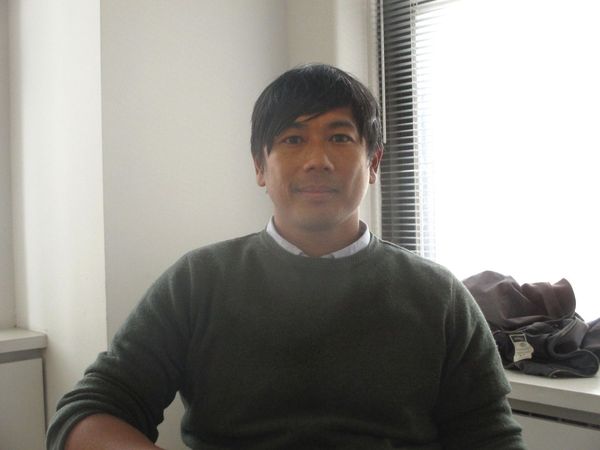 |
| Jon Nguyen on first meeting David Lynch: "In Poland, when he was making Inland Empire." Photo: Anne-Katrin Titze |
Connecting a Mr Smith in Boise, Idaho, to Winkie's diner, splitting Naomi Watts in two, a Bob Dylan memory turned into Jeanne Bates and Dan Birnbaum coming out of a bag, and The Cowboy Monty Montgomery in Mulholland Drive, the air in Eraserhead, a Blue Velvet moment, the lines of Lost Highway, David Lynch's daughters Lula (Laura Dern's name in Wild At Heart) and Jennifer (voice in The Alphabet, starring Peggy Lynch) as bookends, cinematographer Jason S on call to film Jon Nguyen, Rick Barnes and Olivia Neergaard-Holm's David Lynch - The Art Life - all this and more came into my conversation with one of the directors.
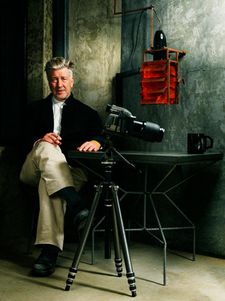 |
| On Mr. Smith: "I think the only person that knows is David. Just as he's the only one who knows what Eraserhead was really about." |
Although the world of David Lynch's early childhood was no larger than two blocks, it contained it all. There is the traumatic, "otherworldly" encounter with a naked woman on the street, he talks about, while we see a big moth wanting to get out by the window of his studio in the Hollywood Hills. "You can live in one place and have everything," is his motto. Time seems to fold in on itself. Lynch begins to talk about a neighbor, Mr. Smith, then pauses, takes a deep breath and says "I can't tell the story. I never talked to Mr. Smith, ever." Instead he scribbles something down on his yellow legal pad. The mystery remains and lives on in our own monstrous minds.
Anne-Katrin Titze: What was your first meeting with David Lynch?
Jon Nguyen: In Poland, when he was making Inland Empire. We started earlier making the film but that was the first time I've met him - David Lynch, the master!
AKT: The documentary has the feel of an audio book at times, as if you created a new genre.
JN: You know, we did interview other people, some of his friends. Somehow when we put it into the film it just didn't feel ... I felt, okay, we have such an intimate relationship, this is a special time because David doesn't normally open up to people. It felt like, let's give him the stage to tell his story. Let's not interrupt it.
AKT: Yes, documentaries tend to have talking heads everywhere.
JN: Historically, you can look back at the film and give David a chance to tell his story.
AKT: It's interesting that the focus is so much on his childhood.
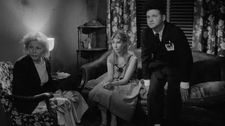 |
| Mrs X (Jeanne Bates), Mary X (Charlotte Stewart) and Henry Spencer (Jack Nance) |
JN: We know that David is very reserved to talk about his films.
AKT: I know. I've tried.
JN: He doesn't. So the best way to get him to talk and understand his films better was by learning more about who he is. It's like that with everybody. His early personal life would somehow give keys to understanding why his films have the shape that they have.
AKT: A few minutes ago, Bingham [Bryant] was looking for you and he couldn't find you. I was sitting in the waiting area and a little dog was running back and forth in the corridor. So we looked at each other and agreed this was a very Lynchian moment. Perfect, I'm going to have to interview the dog because you disappeared!
JN: I was that dog, actually. I could change.
AKT: That's what I mean. The story of Mr Smith in Boise - it's a beautiful moment in your film. David Lynch says he cannot talk about this story. Was there ever any follow-up on that?
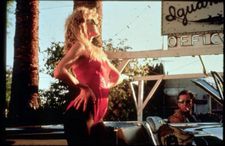 |
| Laura Dern as Lula and Nicolas Cage as Sailor in Wild At Heart |
JN: Oh, yeah! We don't show it on camera, because we didn't have the camera running, but he got really choked up emotionally. One of the rare moments where he was about to cry. Afterwards we were like, we have to figure out what happened with Mr Smith. And we waited another year and we asked him the question. And he started telling the story and almost exactly at the same moment he was kind of "I can't". He got really upset thinking about that moment. So we thought - let's wait, give it some more time.
And he kept saying: "I don't want to talk about it, I don't want to talk about it." Almost three years later after the first time we went back and he started telling about it. And then his daughter walked into the room and he stopped. We don't know what happened. I can only suspect. At first, I was like, what could it be? You think something happened between him and Mr Smith? But he says "I never really knew Mr Smith."
Maybe perhaps now being a 70 year old man, thinking back at that moment - it was the day when his family gathered on the lawn, before he went to Virginia which began the dark period. Maybe thinking back at that day, he remembers what life was like with his family. His mom and dad were together, still alive, and his brother and sister on the lawn, you know.
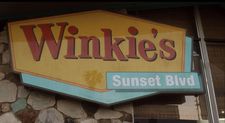 |
| My mind went, who knows why, to the monster behind Winkie's diner in Mulholland Drive |
AKT: A moment of perfection? Paradise lost? With Mr Smith.
JN: Something could have happened that we don't know about or it could just be nostalgic. I don't know if he's crying because he feels guilty or if he's crying because he's yearning for that innocent period.
AKT: It's a pivotal moment in your film.
JN: We went back to try to get it. We couldn't. Something about it, he got upset.
AKT: It seems like the navel of the picture, the abyss. It comes at a time when he had already talked about the Blue Velvet moment, the naked woman, he, as a child, encountered on the street. I suspect audiences expect this to be a moment they can recognise - linking it to one of his films.
JN: Yeah, it's something that I wish we had a solution to. We didn't do it on purpose. And David didn't do it on purpose, because he's not playing with people.
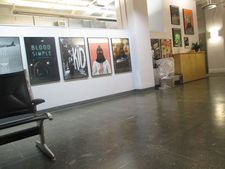 |
| Criterion offices with original Mulholland Dr. poster Photo: Anne-Katrin Titze |
AKT: No, that is really clear.
JN: I was going to remove it from the film. The audience wants answers. I don't want a half story. But then I thought, generally in a lot of David's films, things are loose, let's just leave it. Because his audience can accept it. This one time.
AKT: I agree. I'm glad you left it in.
JN: You don't want people upset. You don't just tell a story and just cut it off halfway.
AKT: But nobody ever does that. I've never seen that in a documentary.
JN: I'm just as curious as the audience. I think the only person that knows is David. Just as he's the only one who knows what Eraserhead was really about.
AKT: It's interesting where audience's minds go. My mind went, who knows why, to the monster behind the [Winkie's] diner [in Mulholland Drive]. That whatever happened with Mr Smith that day, is connected to that scene.
JN: Could be. Maybe Mr Smith killed himself. Maybe David did something bad that he regrets or maybe it's just sentimentality - I miss my mom and dad. I think it's a riddle I don't think we'll ever be able to figure out.
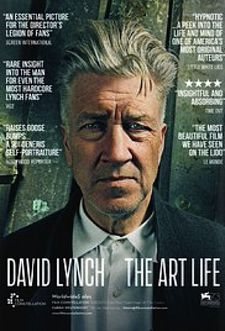 |
| David Lynch - The Art Life poster |
AKT: How did you make the decision when to have his voice synchronised with what we see? There are only a few moments when we are completely in the now.
JN: It was just a technique to squeeze in as much as we could by getting rid of this talking head and just kind of layer what we have with him talking. Most films would have just shown him talking but that takes up that real estate. We could hear his voice but it's nice to see him paint. It's two layers to get more compact, more out of a scene. It's nice to have him there present day, to see the man that he became.
AKT: He didn't mind to have Lula there [shown on film]?
JN: She's around, you know. It's better than chasing her away. She's here, she's sweet, she's just there, you know. It's his chance to share the art life with her.
AKT: She is sitting on his lap at one point, he is concentrating on the screen in front of them, and she is all over the place looking at different things.
JN: We got lucky, because she is about the same age that Jennifer was in the material. It's like the bookends - Eraserhead. Jennifer in Philadelphia as a little girl and then fast forward 40 years - same age, a new daughter.
AKT: Has he seen your film?
JN: Yes. He says he was very happy. He has seen it three times, four times. He should be because everything in the film is his. The artworks, the photographs. The voice. It's very pure Lynch. We did it on purpose. Let's cook using all his ingredients.
AKT: Thank you. Now you can transform back into the dog.
Related features: In the spirt of Twin Peaks - Jon Nguyen on splitting Naomi Watts in two, a Bob Dylan memory, understanding Mulholland Drive, the air in Eraserhead, the lines of Lost Highway, Oscar Kokoschka and how David Lynch - The Art Life all came together.
David Lynch - The Art Life is in cinemas in the US and will open in the UK on June 9.





















